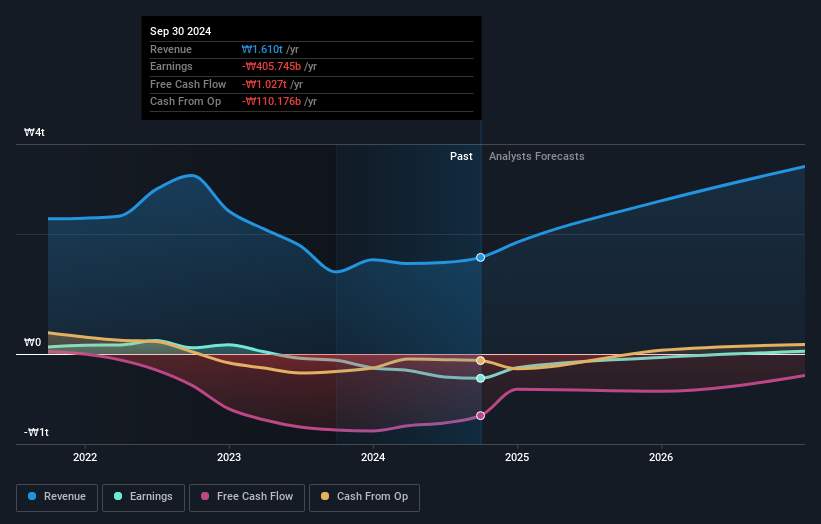- South Korea
- /
- Chemicals
- /
- KOSE:A011790
SKC (KRX:011790) pops 11% this week, taking five-year gains to 230%

The worst result, after buying shares in a company (assuming no leverage), would be if you lose all the money you put in. But on a lighter note, a good company can see its share price rise well over 100%. For example, the SKC Co., Ltd. (KRX:011790) share price has soared 220% in the last half decade. Most would be very happy with that. In more good news, the share price has risen 65% in thirty days.
Since the stock has added ₩603b to its market cap in the past week alone, let's see if underlying performance has been driving long-term returns.
View our latest analysis for SKC
Because SKC made a loss in the last twelve months, we think the market is probably more focussed on revenue and revenue growth, at least for now. Shareholders of unprofitable companies usually desire strong revenue growth. Some companies are willing to postpone profitability to grow revenue faster, but in that case one would hope for good top-line growth to make up for the lack of earnings.
Over the last half decade SKC's revenue has actually been trending down at about 9.2% per year. On the other hand, the share price done the opposite, gaining 26%, compound, each year. It just goes to show tht the market is forward looking, and it's not always easy to predict the future based on past trends. Still, we are a bit cautious in this kind of situation.
The image below shows how earnings and revenue have tracked over time (if you click on the image you can see greater detail).

SKC is a well known stock, with plenty of analyst coverage, suggesting some visibility into future growth. So it makes a lot of sense to check out what analysts think SKC will earn in the future (free analyst consensus estimates)
What About The Total Shareholder Return (TSR)?
We've already covered SKC's share price action, but we should also mention its total shareholder return (TSR). Arguably the TSR is a more complete return calculation because it accounts for the value of dividends (as if they were reinvested), along with the hypothetical value of any discounted capital that have been offered to shareholders. Dividends have been really beneficial for SKC shareholders, and that cash payout contributed to why its TSR of 230%, over the last 5 years, is better than the share price return.
A Different Perspective
It's nice to see that SKC shareholders have received a total shareholder return of 118% over the last year. Since the one-year TSR is better than the five-year TSR (the latter coming in at 27% per year), it would seem that the stock's performance has improved in recent times. Someone with an optimistic perspective could view the recent improvement in TSR as indicating that the business itself is getting better with time. It's always interesting to track share price performance over the longer term. But to understand SKC better, we need to consider many other factors. To that end, you should learn about the 2 warning signs we've spotted with SKC (including 1 which shouldn't be ignored) .
If you are like me, then you will not want to miss this free list of undervalued small caps that insiders are buying.
Please note, the market returns quoted in this article reflect the market weighted average returns of stocks that currently trade on South Korean exchanges.
New: Manage All Your Stock Portfolios in One Place
We've created the ultimate portfolio companion for stock investors, and it's free.
• Connect an unlimited number of Portfolios and see your total in one currency
• Be alerted to new Warning Signs or Risks via email or mobile
• Track the Fair Value of your stocks
Have feedback on this article? Concerned about the content? Get in touch with us directly. Alternatively, email editorial-team (at) simplywallst.com.
This article by Simply Wall St is general in nature. We provide commentary based on historical data and analyst forecasts only using an unbiased methodology and our articles are not intended to be financial advice. It does not constitute a recommendation to buy or sell any stock, and does not take account of your objectives, or your financial situation. We aim to bring you long-term focused analysis driven by fundamental data. Note that our analysis may not factor in the latest price-sensitive company announcements or qualitative material. Simply Wall St has no position in any stocks mentioned.
About KOSE:A011790
SKC
Manufactures and sells basic chemical raw materials and copper foils for batteries.
High growth potential very low.

